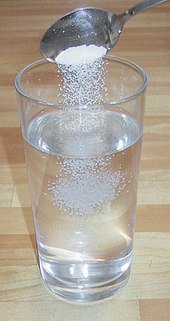
Back Oplossing (chemie) Afrikaans محلول Arabic Disolución AST Solusyon (kimika) BCL Раствор Byelorussian Рашчына BE-X-OLD Разтвор Bulgarian দ্রবণ Bengali/Bangla Rastvor BS Solució química Catalan

In chemistry, a solution is a special type of homogeneous mixture composed of two or more substances. In such a mixture, a solute is a substance dissolved in another substance, known as a solvent. If the attractive forces between the solvent and solute particles are greater than the attractive forces holding the solute particles together, the solvent particles pull the solute particles apart and surround them. These surrounded solute particles then move away from the solid solute and out into the solution. The mixing process of a solution happens at a scale where the effects of chemical polarity are involved, resulting in interactions that are specific to solvation. The solution usually has the state of the solvent when the solvent is the larger fraction of the mixture, as is commonly the case. One important parameter of a solution is the concentration, which is a measure of the amount of solute in a given amount of solution or solvent. The term "aqueous solution" is used when one of the solvents is water.[1]
- ^ "Solutions". Washington University Chemistry Department. Washington University. Retrieved 13 April 2018.
© MMXXIII Rich X Search. We shall prevail. All rights reserved. Rich X Search